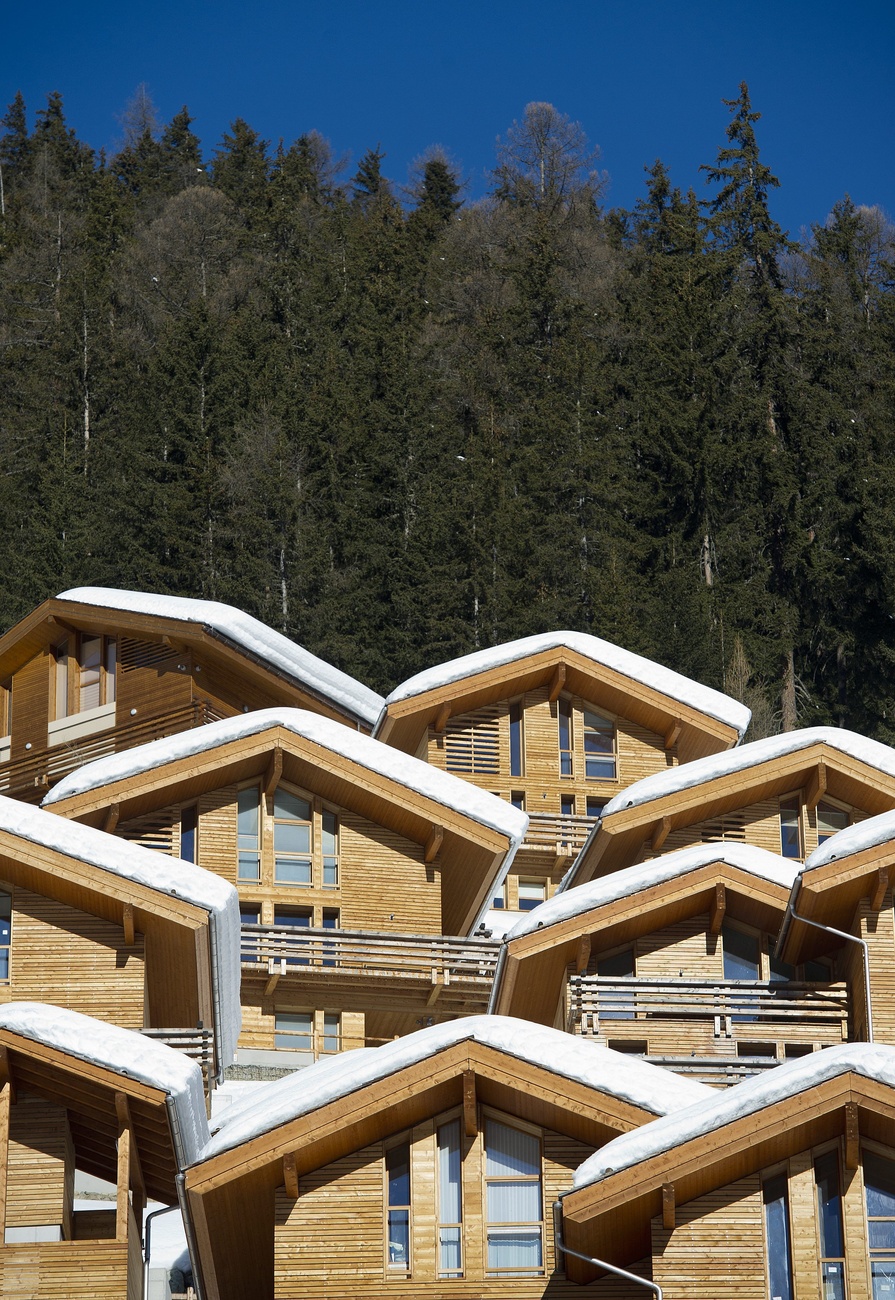
Swiss divisions highlighted by vote on imputed rental-value tax

Imputed rental-value tax has long been a bone of contention between homeowners and tenants, but the divide runs much deeper. On September 28, the Swiss will head to the polls to vote on this controversial tax. Here is a closer look at what’s at stake.
The debate over imputed rental-value tax is nothing new. But now, Swiss voters will decide whether to scrap this tax for homeowners. Swissinfo takes a closer look at who stands where, and why.
1. Old vs young generation
Abolishing the imputed rental-value tax is one of several proposals that promise clear benefits for those over 60 years of age.
Most older homeowners have largely paid off their mortgages, and their properties are generally well maintained, which means the imputed rental-value system offers them little benefit. With low mortgage interest and little renovation costs to deduct, all that’s left is the main drawback of the system: the tax burden.
Last year, the older generation already scored a win with the proposal to introduce a 13th pension payment. Following the same pattern, the Centre Party’s plan to abolish the “marriage penalty” on state pensions is also set to benefit retirees. The proposal, which is already in the pipeline, promises a potential pension boost for married couples.
Pensioners are the most reliable voters in Switzerland. “The median age of a Swiss voter is around 57,” says Martina Mousson, political analyst at the GfS research institute in Bern.
This means that the baby boomers, now aged between 60 and 80, have the power to shape Switzerland largely according to their own needs.
By contrast, those at a disadvantage are mainly young people, who vote less frequently, and foreigners, who are often not eligible to vote.
Foreigners mostly live in rented accommodation while 44% of Swiss voters reside in their own flats or houses. Looking at the entire population, including foreign nationals, that share drops by ten percentage points to about one third.
We explain here what the imputed rental value is and everything about the vote of September 28:

More
Will Switzerland finally do away with imputed rental-value tax on homeowners?
2. Homeowners vs tenants
The push to scrap the imputed rental-value system has all the ingredients for a referendum campaign fuelled by class struggle.
Simply put, it is owners versus non-owners, homeowners versus tenants. And it is highly unlikely that property owners would vote against a system that puts money in their pockets. A fierce battle along the same conflict lines already erupted just half a year ago.
Back then, the battle centred on two amendments to tenancy law which the political left argued would weaken tenant protections. In its campaign, it warned of rising rents and “higher returns for real estate corporations”.
The left-wing Social Democratic Party wrote at the time: “Rents have exploded and the profits for real estate corporations have continued to rise at the expense of tenants.” With that message, the left carried the day at the ballot box.
In its current no campaign, the Social Democrats ask: “Billion for the richest?” and warn: “Tenants will pay the price”.
The Social Democrats are already lining up their next campaign with the same goal. They are currently collecting signatures for a “rental-price initiative” aimed at putting an end to “abusive profits”. For the political left, the imputed rental value debate is a perfect way to keep this core issue of tenant protection in focus.

For Mousson it’s clear. “The rift between houseowners and tenants forms the main conflict line in this campaign. It also cuts across other dimensions such as age, gender and social status.”
3. Urban vs rural
Homeowners tend to live in rural areas while tenants live in cities. This simple rule, true almost everywhere, also applies to Switzerland, where lower property prices in the countryside make owning a home far more affordable.
In Switzerland, this rule aligns with the classic left-right pattern. Cities tend to be progressive and left-leaning, while rural areas tend to be more conservative and right-leaning.
According to Mousson, the same pattern was already evident in the 2020 vote on the hunting law revision and in environmental issues such as the 2021 CO2 law. It becomes particularly apparent when an initiative is about agriculture, as was the case in 2021 with the pesticide initiatives as well as the drinking water initiative.
4. Tourist regions vs urban centres
Mousson also notes that the urban-rural divide takes on a particularly sharp form when it comes to the imputed rental value. She sees a specific conflict line between tourist regions and urban centres.
Tourist destinations benefit from the existing imputed rental-value system, and in many mountain regions the number of second homes has recently skyrocketed. This is an advantage for the tourist resorts as every second home is subject to the imputed rental-value tax which is paid where the property is located.
For many mountain communities, these revenues must not be lost if the imputed rental-value system were abolished. This is the reason for the upcoming vote, which is tellingly dubbed the “Introduction of a cantonal property tax on second homesExternal link”.
This tax is essentially a compensation for mountain cantons; one might even call it a “special perk”. Parliament wanted to reform the system, and everyone was on board – except the tourist cantons. If the initiative is accepted, these cantons will still be able to levy a tax on second homes, even if the imputed rental-value tax is abolished.
But now, even in the mountain cantons a rift is emerging between government and citizens. In 2012, locals rejected the second-home initiative which aimed to limit the number of holiday homes. Revenue clearly mattered more than fears of empty beds and ghost towns.
Since then, rents in mountain cantons have also risen as more and more living space has been converted into holiday accommodation. This has led to a housing shortage in Swiss tourist regions, along with a growing scepticism towards holiday homes. “The downsides of the second-home boom have now made their way into public awareness,” says Mousson.
It will therefore be decisive which system the population of the tourist cantons trust to be more effective in levying taxes on second homes: the existing one or a new system the cantons would first have to introduce.
5. Banks vs businesses
In the debate over abolishing the imputed rental-value tax, banks and businesses – usually close allies – have different opinions. Banks are keen to keep it as they profit from mortgage interest which remains tax deductible and discourages homeowners from paying off their debts.
Banks make big bucks with mortgages, a business they are reluctant to give up. In Switzerland, household mortgage debt is among the highest in the world relative to GDP. In 2024, it ran up to CHF1,271 billion ($1,580 billion), more than the country produces in a year, namely 146% of GDP.
This share is constantly growing and, according to the Swiss National Bank, such concentration could pose a major risk to the economy.
It’s hard to tell how much the tax incentives for taking on debt have fuelled Switzerland’s record-breaking mortgage load. Mortgage broker Moneypark estimates that by 2030, the market could shrink by CHF50 billion to CHF150 billion if the imputed rental-value tax were scrapped.
Unlike the banks, businesses are divided in this matter. The construction industry and related industries fear losing renovation contracts and therefore oppose the reform. Other sectors, however, hope it will boost purchasing power and consumer spending.
Since these other sectors make up the majority of the Swiss Trade Association, the business community generally supports abolishing this tax.
Edited by Samuel Jaberg. Adapted from German by Billi Bierling/ts
More

In compliance with the JTI standards
More: SWI swissinfo.ch certified by the Journalism Trust Initiative



























You can find an overview of ongoing debates with our journalists here . Please join us!
If you want to start a conversation about a topic raised in this article or want to report factual errors, email us at english@swissinfo.ch.